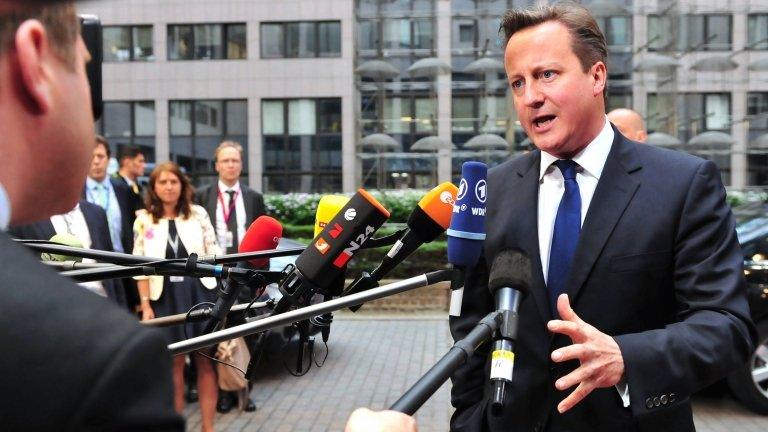Europe's giant tussle over Jean-Claude Juncker
- Published
- comments
Matthew Price explains why the appointment of a new European Commission president is causing divisions among members
Viewed from North America, where I have been for the past two weeks, events in Europe since the May European Parliament elections have been hard to explain to a distant audience.
On the surface, a gigantic tussle surrounds a politician few voters have heard of. The campaign of Jean-Claude Juncker, a former Luxembourg prime minister, to become the EU's chief executive is riddled with complexity but it is exposing many of the fundamental fault lines that lie at the heart of the European project. It will dominate a European summit next week and perhaps for weeks after.
Already, the question of who should be the next president of the European Commission has shown its potential to divide. It has caused a spat between the UK and Germany and, unless it is resolved, it threatens to paralyse the EU's key institutions.
David Cameron has risked some of his credibility in fighting to get a reformer into the post. And it has unsettled Angela Merkel, Europe's most powerful and influential politician. One German paper said "she looks almost lost, tugged here and there by forces that she does not control".
But, at its heart, the Juncker saga is a struggle over competing visions of Europe.
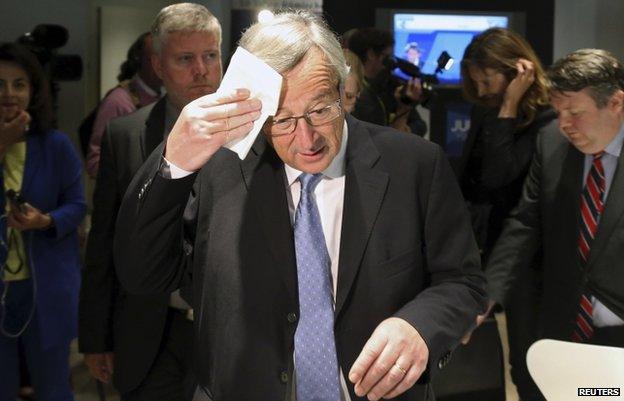
Jean-Claude Juncker is the lead candidate for centre-right grouping the European People's Party
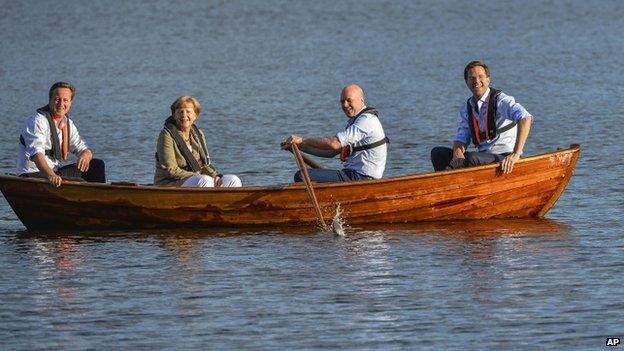
David Cameron (L) met centre-right leaders from Germany, Sweden and the Netherlands last week
Jean-Claude Juncker emerged as the main candidate to become Commission president through a bafflingly complicated process.
Some voters - although not many - understood that their vote in the elections for the European Parliament could determine who became the head of another institution, the European Commission. In fact the responsibility for proposing a new president lies with the heads of government although the views of the parliament have to be taken into account. But MEPs adopted a system by which the candidate of the grouping in parliament which gained the most seats would be proposed as head of the Commission.
It sowed the seeds for a future clash between the European Council and the parliament.
Many heads of government were lukewarm about the whole idea but most of them went along with it. The candidate of Angela Merkel's centre-right parliamentary grouping, the European People's Party (EPP), was Jean-Claude Juncker and on the campaign trail she urged people to "use your vote to ensure that Juncker becomes President of the Commission".
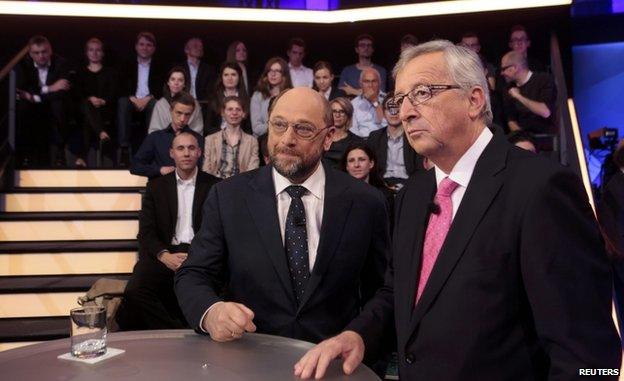
Mr Juncker (R) and European Socialist candidate Martin Schulz took part in a televised debate in May
And the candidates for the various groupings ran a campaign, criss-crossing Europe, holding debates. Very few people followed the debates but it enabled these candidates to claim a democratic mandate.
When the EPP emerged with the most seats, it quickly insisted Jean Claude-Juncker should lead the Commission and it won support from other groups in the parliament. Almost immediately David Cameron chose to spend considerable political capital in opposing him.
Why? Mr Juncker is seen as old-guard, a veteran of the Brussels establishment committed to deeper European integration, a man unlikely to cut the UK prime minister any slack as he prepares to renegotiate Britain's relationship with the EU (although the key negotiations will be with the other member states). The prime minister questioned the legitimacy of Mr Juncker's candidacy. "He did not stand anywhere and was not elected by anyone," he said.
Angela Merkel was torn. Although Mr Juncker was the candidate of her parliamentary grouping, she had reservations. During the eurozone crisis, he had attacked Germany for acting as if it was "the only virtuous country in the world" and behaving in "a very un-European way". She was also mindful of David Cameron's dilemma, how to sell a reformed EU to sceptical British voters and, for the German chancellor, keeping the EU together remains central to her legacy.
All of this came to a head two days after the elections at a summit in Brussels. Ms Merkel felt the parliament was trying to muscle the Council into backing Mr Juncker.
In her comments she appeared cool towards the man she had publically supported. "At the end there will be a fairly broad tableau of names on the table," she said. The German press sensed a backtracking and were unusually dogged in their questioning of her.
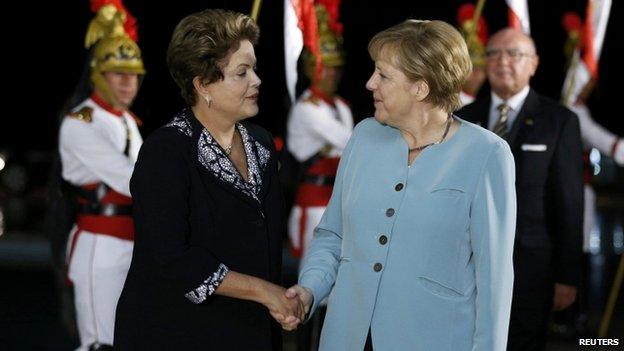
The German chancellor, here with Brazil's President Rousseff, is adamant about Britain's future role in the EU
Back in Berlin she made it clear that Britain's membership of the EU was no trivial matter. "I consider it grossly negligent," she said, "in fact unacceptable, how easily some people say that it is really all the same whether Britain goes along or not or more, whether Britain remains a member of the EU or not."
The German press started redefining the story. It was about a choice: "Britain versus democracy."
The German papers correctly pointed out that Ms Merkel had told voters to use their vote to back Mr Juncker. She could not just ditch him. It would mock the will of the voters. But it is questionable whether he has a popular mandate. Even in Germany only a smattering of voters could identify him. There is very little evidence that people cast their votes with the future president of the Commission in mind.
But it did not prevent some politicians warning of "electoral fraud". Der Spiegel defined the issue as being "how serious the EU is about its promise to become more democratic". There was far less coverage about whether Jean-Claude Juncker was the right man to lead the EU at a moment of rising disenchantment with the European project.
It riled the Germans further when David Cameron was reported as hinting that a Juncker presidency could hasten the UK leaving the EU. It led Angela Merkel to say that threats do not belong in "the European spirit". Her public comments swung back behind Mr Juncker.
David Cameron has some allies, although probably not enough to block the former Luxembourg prime minister. Over 20 heads of government called Jean-Claude Juncker to offer their support.
So it all comes down to the German chancellor. If she sticks with Mr Juncker, almost certainly David Cameron will lose and he has staked a lot on this battle.
For if he cannot get support for a bolder, more flexible reformer to lead the EU, how will he convince voters that he can deliver a changed EU that Britain should stay part of?
A Juncker victory would also mark a shift in the balance of power away from the heads of government and towards a parliament that backs closer integration. It would signal a strengthening of the European Parliament just at the moment when David Cameron wants to see more powers for national parliaments.
Some are suggesting that at the European summit next week the leaders should discuss and agree on a reform agenda for the next Commission before discussing who will lead the union. Ms Merkel agrees. Some are suggesting that a possible way forward would be to get Mr Juncker to agree to a reform agenda as a way of breaking the deadlock.
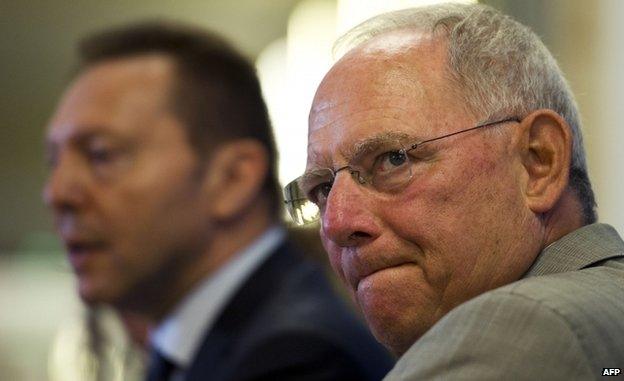
German Finance Minister Wolfgang Schaeuble (R) wants a "more intelligent" EU
The difficulty for Mr Cameron is that his battle is not just about delivering a Europe which is more competitive and delivers growth and jobs. He needs to deliver a Europe which does less and which leaves more room for the nation states.
There are voices arguing for a different kind of Europe. German Finance Minister Wolfgang Schaeuble, a committed European, has been speaking of needing "a more intelligent union… not the mindless pursuit of more Europe". But getting parliament and the Commission to back less Europe will be immensely difficult.
Angela Merkel's instinct is to play it long. She says that a good result "takes time". "We have it and I will use it."
There was some talk of persuading Jean-Claude Juncker to stand aside. That has become more difficult. In the face of attack he is digging in. He now sees his candidacy as an issue of pro-European forces standing together.
This argument risks the EU appearing, once again, inward-looking, tied up with issues that matter little to voters.
But in the end this is a power struggle over different visions for Europe. On the one hand are those committed to an ever-closer union and a strengthening of the European Parliament. And on the other side are those like David Cameron who believe that "Brussels has got too big, too bossy, too interfering".
The question is whether the two sides can find a compromise.
- Published24 June 2014
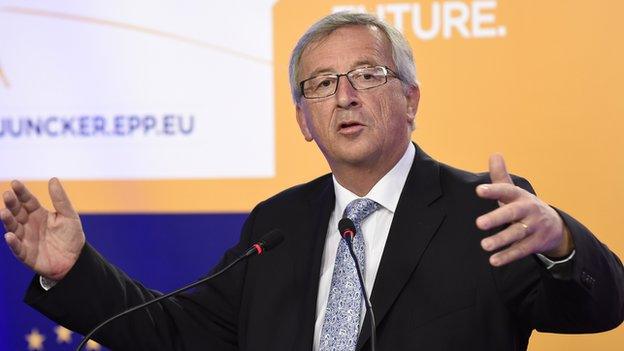
- Published13 June 2014
